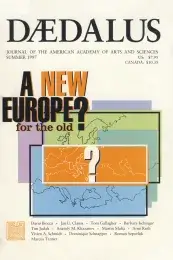A New Europe for the Old?
Finding a title for this issue of Dædalus has not been easy. An early possibility, which certainly had the advantage of novelty, was to call it, quite simply, “A Farewell to Europe?” There were many reasons for asking whether the principle of truth in advertising might not appear to be violated by such a seemingly incendiary title. Might readers not unwittingly think such a title to be a verdict on the European Union, on the fact that the Maastricht accords, which once seemed destined for implementation in the time schedule originally agreed upon, had come to be challenged in ways that those who initially framed the treaty had scarcely anticipated? Had the events that led to the defeat of President Chirac’s electoral gamble, combined with the hostility of the Bundesbank to Chancellor Kohl’s plans, virtually guaranteed that a single European currency—the Euro—would not see the light of day in the next years? This issue of Dædalus, it must be said at once, is not concerned principally with the European Union or with its vicissitudes. Rather, it seeks to treat other themes, perhaps no less consequential and certainly no less ambiguous. For these subjects, which have to do with the European world as it has evolved since 1989, the title of the first essay in this issue seemed both appropriate and apposite. “A New Europe for the Old?” carries just that element of ambiguity that seems to reflect sentiment in Europe today, both in the Europe that is only incidental at the moment celebrating the half-centenary of the proclamation of the Marshall Plan and that other Europe that recalls 1947 something other than an annus mirabilis.
. . .
